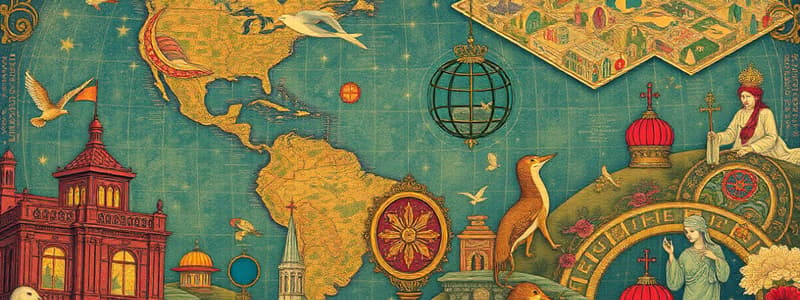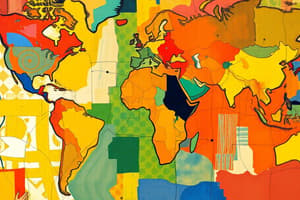Podcast
Questions and Answers
Match the following historical figures and terms with their descriptions:
Match the following historical figures and terms with their descriptions:
Hernán Cortés = Led the conquest of the Aztec Empire in Mexico Akbar = Mughal emperor known for his tolerant policies Devshirme = System of recruiting young Christian boys in the Ottoman Empire Zamindars = Landowning elites collecting taxes for Mughal emperors
Match the following events with their effects:
Match the following events with their effects:
Great Dying = Killed millions of Indigenous peoples in the Americas Little Ice Age = Period of colder temperatures affecting agriculture General Crisis = Widespread instability marked by wars and rebellions Columbian Exchange = Exchange of plants, animals, and diseases between worlds
Match the following empires with their geographical focus:
Match the following empires with their geographical focus:
Mughal Empire = Indian subcontinent Ottoman Empire = Southeastern Europe, Middle East, North Africa Russian Empire = Northern parts of Eurasia Safavid Empire = Persia (modern-day Iran)
Match the following economic terms with their definitions:
Match the following economic terms with their definitions:
Signup and view all the answers
Match the following dynasties with their historical periods:
Match the following dynasties with their historical periods:
Signup and view all the answers
Match the following emperors with their policies:
Match the following emperors with their policies:
Signup and view all the answers
Match the following terms with their specific historical context:
Match the following terms with their specific historical context:
Signup and view all the answers
Match the following impacts with their corresponding historical changes:
Match the following impacts with their corresponding historical changes:
Signup and view all the answers
Match the following socio-economic categories with their descriptions:
Match the following socio-economic categories with their descriptions:
Signup and view all the answers
Match the following terms with their relevance to global interactions:
Match the following terms with their relevance to global interactions:
Signup and view all the answers
Study Notes
16th-19th Century Global Transformations
- Hernán Cortés: Led the conquest of the Aztec Empire.
- Great Dying: Mass death of Indigenous Americans due to disease.
- Little Ice Age: Period of cooler temperatures (16th-19th centuries).
- General Crisis: Widespread instability (wars, rebellions, economic downturn) in the 17th century.
- Columbian Exchange: Exchange of plants, animals, diseases, and ideas between Old and New Worlds.
- Mercantilism: Economic theory prioritizing wealth accumulation and favorable trade.
- Mestizo: Mixed European and Indigenous American ancestry.
- Mulattoes: Mixed European and African ancestry.
- Settler colonies: Colonies with permanent European settlement.
- Russian Empire: Vast empire across Northern Eurasia, expanding from Moscow.
- Yasak: Tribute system for non-Russian peoples in the Russian Empire.
- Ming Dynasty: Chinese dynasty (1368-1644) with stability and prosperity.
- Qing Expansion: Military expansion of the Qing Dynasty (1644-1912).
- Ottoman Empire: Powerful empire conquering parts of SE Europe, Middle East, and North Africa (14th-17th centuries).
- Devshirme: System of forcibly recruiting Christian boys for military or civil service in the Ottoman Empire.
- Safavid Empire: Persian empire (16th century) spreading Shia Islam.
- Mughal Empire: Powerful empire in India (16th century) with a mix of Islamic and Hindu cultures.
- Zamindars: Landowning elites collecting taxes for Mughal emperors.
- Akbar: Mughal emperor (1556-1605); known for tolerance and progressive policies.
- Aurangzeb: Mughal emperor (1658-1707); known for strict Islamic policies.
- Songhay Empire: Large, wealthy West African empire (15th-16th centuries).
- Pueblo Revolt: Indigenous rebellion against Spanish colonial rule (1680).
Studying That Suits You
Use AI to generate personalized quizzes and flashcards to suit your learning preferences.
Description
Explore the key events and concepts that shaped the world from the 16th to the 19th centuries. This quiz covers significant topics such as the Columbian Exchange, economic theories, and cultural transformations through colonization. Test your knowledge on the impacts of these global transformations on societies and the environment.




